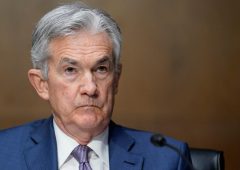Jerome Powell Commented on Future Rate Cuts – Here is What He Said
15.07.2024 21:15 2 min. read Alexander Stefanov
Jerome Powell started his recent interview with David Rubenstein by saying he won't give any hints on potential rate cuts or hikes.
He stressed that Fed wants to get this right, so that is why they aren’t in a rush for rate cuts before solid data, especially after the particularly weak Q1 reports.
Rubenstein asked when the time comes for Fed to cut interest rates, does Powell think that they will go back to years ago to the “free money period” when interest rates were almost zero.
Powell said that the period between global financial crisis (2007/2008) and the Covid pandemic was historically unusual with very low interest rates through that era.
“This also includes part of the era when for example sovereign debt of major european sovereigns was trading at a significantly negative rate. But even with rates that low, inflation was very low below target. The question is what caused that and if the forces that caused it are gone for now.”
According to Fed’s Chair most people attribute the low inflation era to slow moving forces like demographics, globalization and technologcal evolution, which may or may not have changed.
Nonetheless he is looking where the USA is at present:
“Funds rate is around 5.3% and feels like it is restrictive but not serverly restrictive. The neutral rate must have risen from where it was during thte intercrisis period. [Although I can’t prove that. the neutral rate is probably higher than it was then so rates will be higher.”
Rubenstein asked why did the ECB lower interest rates before Fed and whether it was because their economy is weaker.
Powell stated:
“The eurozone went through a signifcant period of very low growth while the US was growing at more than 3% last year so we are in a different place.”
Ideally he and the Fed don’t think that going up and down with the rates is an ideal option. That is why he wants to be sure before taking decisive action, based on solid data.
-
1
U.S. Jobless Claims Dip to 218,000, Beating Expectations
25.09.2025 15:52 2 min. read -
2
U.S. Government Shutdown Stalls Key Jobs and Inflation Data
03.10.2025 16:03 2 min. read -
3
U.S. Faces Another Shutdown Showdown as Deadline Nears
30.09.2025 15:30 2 min. read -
4
Political Battles Overshadow America’s Growing Fiscal Crisis
13.10.2025 10:00 2 min. read -
5
US Shutdown: Here is When it Could Finish According to Polymarket
06.10.2025 18:00 3 min. read
Political Battles Overshadow America’s Growing Fiscal Crisis
The latest deadlock in Washington over a partial government shutdown highlights a recurring pattern: political posturing often overshadows the country’s more pressing financial challenges.
Wall Street’s New Crystal Ball: Why Bank Earnings Are Critical Amidst Economic Uncertainty
The usual deluge of economic data that guides Wall Street has run dry, interrupted by an ongoing federal government shutdown.
Markets Jittery as U.S.-China Trade Spat Revives Uncertainty in Global Supply Chains
Tensions between the United States and China have flared again after President Donald Trump imposed steep tariffs on Chinese goods, prompting a measured response from Beijing.
U.S. Consumer Confidence Holds Steady Amid Mixed Economic Signals
The latest University of Michigan survey shows U.S. consumer sentiment largely unchanged, with the index at 55.0, slightly above economists’ expectations of 54.2. September’s reading was 55.1, indicating little shift in household outlooks.
-
1
U.S. Jobless Claims Dip to 218,000, Beating Expectations
25.09.2025 15:52 2 min. read -
2
U.S. Government Shutdown Stalls Key Jobs and Inflation Data
03.10.2025 16:03 2 min. read -
3
U.S. Faces Another Shutdown Showdown as Deadline Nears
30.09.2025 15:30 2 min. read -
4
Political Battles Overshadow America’s Growing Fiscal Crisis
13.10.2025 10:00 2 min. read -
5
US Shutdown: Here is When it Could Finish According to Polymarket
06.10.2025 18:00 3 min. read
Federal Reserve Chairman Jerome Powell recently addressed Bitcoin's role in the financial market, comparing it to gold rather than the US Dollar.
Jerome Powell's testimony infront of the US Congress gave some insight into the Federal Reserve's current stance on rate cuts.
Fed Chair Jerome Powell recently commented on the US national debt in a live interview with David Rubenstein, Co-Chairman of Carlyle Group.
Jrome Powell, Chair of the US Federal Reserve, continues to express optimism about achieving the inflation target of 2%.
Federal Reserve chair Jerome Powell testified in Capitol Hill yesterday as part of his twice-yearly report on the state of the economy.
Jerome Powell, the Federal Reserve Chair, recently hinted at a potential interest rate cut in September, which could shake up the cryptocurrency market.
As we enter deeper into 2025, and as Bitcoin and the rest of the brand name projects struggle, most of the traders shifted their attention towards the presale sector.
Bitcoin’s recent price fluctuations have caught the attention of the crypto community, with the asset briefly dipping below $100,000 during the last week of January.
Jim Cramer, the host of CNBC’s Mad Money, has flagged growing risks for U.S. stocks as the year progresses, focusing on investor expectations surrounding Federal Reserve interest rate cuts.
The financial sector, including the stock market, has faced a challenging start to the year, with several downturns and unsettling crashes over the past few months.
Jim Cramer, the host of CNBC’s Mad Money, has made headlines with his latest prediction of an impending market crash.
What does the weakening labour market mean for BTC? The latest U.S. employment report revealed that nonfarm payrolls increased by 143,000. in January, falling short of Wall Street's expectations.
Cryptocurrency has long been full of opportunities, but for beginners, it can feel overwhelming due to high fees, complex technology, and fast-changing trends.
Jordan has announced plans to develop a comprehensive regulatory framework for virtual and digital assets within a year, aiming to align with global standards and boost its digital economy.
Joseph Lubin, the co-founder of Ethereum and CEO of ConsenSys, has expressed his belief that the growth of Web3 will be far more significant than the dot-com boom of the 1990s.
SharpLink Gaming has revealed plans to allocate $475 million into Ethereum (ETH), positioning the digital asset as a key part of its treasury strategy.
An acclaimed journalist recognized for exposing human trafficking and cryptocurrency scams in Cambodia has been detained by the country's military police.
According to Goode Intelligence, global biometric payment transactions are projected to hit $5.8 trillion and involve three billion users by 2026.
Mastercard and JPMorgan’s new B2B cross-border payment solution marks a significant step in the integration of blockchain-based tools with traditional banking infrastructure.
Numerai, a San Francisco hedge fund blending artificial intelligence with crypto incentives, has landed one of its biggest endorsements yet.


